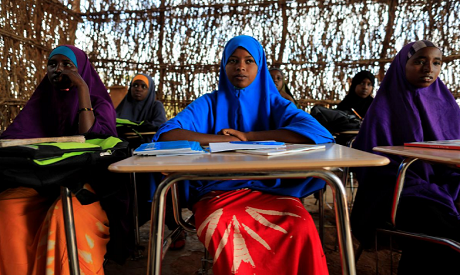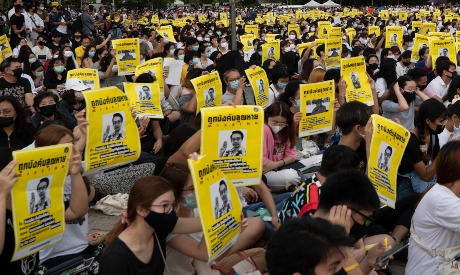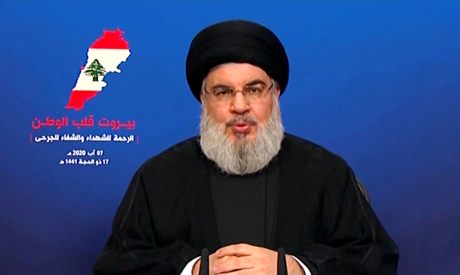AFP , Wednesday 12 Aug 2020

Supporters of the Imam Mahmoud Dicko and other opposition political parties attend a mass protest demanding the resignation of Mali's President Ibrahim Boubacar Keita in Bamako, Mali August 11, 2020. REUTERS

Related

West Africa mediator urges end to Mali protests

UNESCO to restore Mali's conflict-hit Bandiagara site

UN plane botches landing in Mali, wounding 6

Mali appoints new constitutional court judges in bid to end crisis

Mali opposition reiterates demand for president to resign

Security forces in Mali's capital fired tear gas Wednesday to clear hundreds of protesters from a central square, where they had camped overnight following a protest demanding the president's resignation.
About 1,000 people spent the night on the streets of the capital Bamako, an AFP journalist said, before national guardsmen and gendarmes broke them up early in the morning.
"This is a provocation from the regime," said Nouhou Sarr, from the Mali's opposition June 5 Movement. "Rounds of tear gas will not deter us".
Aminata Diallo, a 19-year-old opposition supporter, said that security forces began dispersing the protesters in the early morning while people were eating and washing.
Thousands of protesters marched in Bamako on Tuesday, despite rainfall and pleas from mediators to stay home, to demand the resignation of embattled President Ibrahim Boubacar Keita.
The rally marked a resumption of opposition protests after a weeks-long truce in the June 5 Movement's push to topple the 75-year-old leader.
The loose alliance of opposition and religious leaders has been channeling deep anger in Mali over a dire economy, perceived government corruption and an eight-year jihadist conflict.
Its campaign plunged Mali into crisis last month when 11 people died during three days of unrest following an anti-Keita protest, in the worst political strife Mali has seen in years.
The 15-nation ECOWAS bloc stepped in to mediate, with its heads of government suggesting the formation of a new unity government to end the crisis, while sticking by Keita.
The June 5 Movement has repeatedly rejected the proposals and continues to demand Keita's departure.
The group also ignored a plea from former Nigerian President Goodluck Jonathan, the chief ECOWAS mediator to Mali, who on Monday urged them stop protesting and to enter dialogue.
The poor Sahel nation's neighbours and allies are anxious to prevent it sliding into chaos.
Swathes of Mali's territory are already outside of the control of the government, which is struggling to contain a jihadist insurgency which first emerged in 2012, and which has claimed thousands of lives.
About 1,000 people spent the night on the streets of the capital Bamako, an AFP journalist said, before national guardsmen and gendarmes broke them up early in the morning.
"This is a provocation from the regime," said Nouhou Sarr, from the Mali's opposition June 5 Movement. "Rounds of tear gas will not deter us".
Aminata Diallo, a 19-year-old opposition supporter, said that security forces began dispersing the protesters in the early morning while people were eating and washing.
Thousands of protesters marched in Bamako on Tuesday, despite rainfall and pleas from mediators to stay home, to demand the resignation of embattled President Ibrahim Boubacar Keita.
The rally marked a resumption of opposition protests after a weeks-long truce in the June 5 Movement's push to topple the 75-year-old leader.
The loose alliance of opposition and religious leaders has been channeling deep anger in Mali over a dire economy, perceived government corruption and an eight-year jihadist conflict.
Its campaign plunged Mali into crisis last month when 11 people died during three days of unrest following an anti-Keita protest, in the worst political strife Mali has seen in years.
The 15-nation ECOWAS bloc stepped in to mediate, with its heads of government suggesting the formation of a new unity government to end the crisis, while sticking by Keita.
The June 5 Movement has repeatedly rejected the proposals and continues to demand Keita's departure.
The group also ignored a plea from former Nigerian President Goodluck Jonathan, the chief ECOWAS mediator to Mali, who on Monday urged them stop protesting and to enter dialogue.
The poor Sahel nation's neighbours and allies are anxious to prevent it sliding into chaos.
Swathes of Mali's territory are already outside of the control of the government, which is struggling to contain a jihadist insurgency which first emerged in 2012, and which has claimed thousands of lives.




/cdn.vox-cdn.com/uploads/chorus_image/image/67190598/463140936.jpg.0.jpg)



